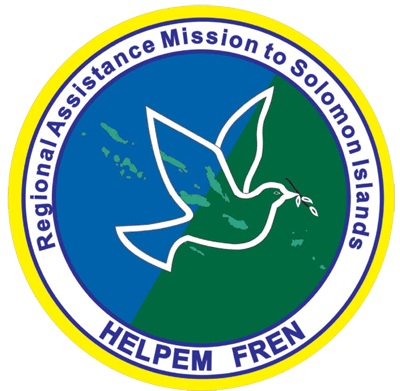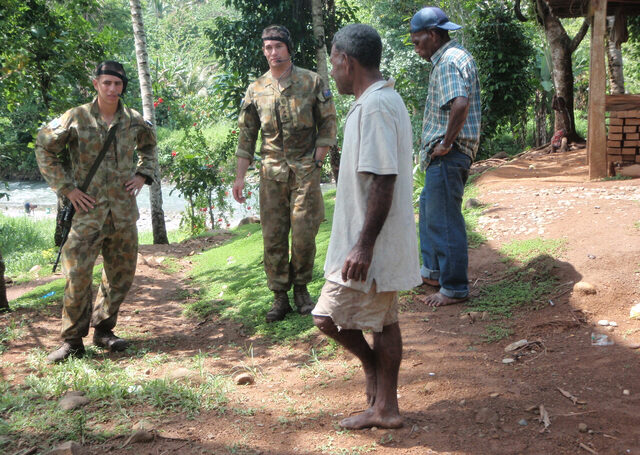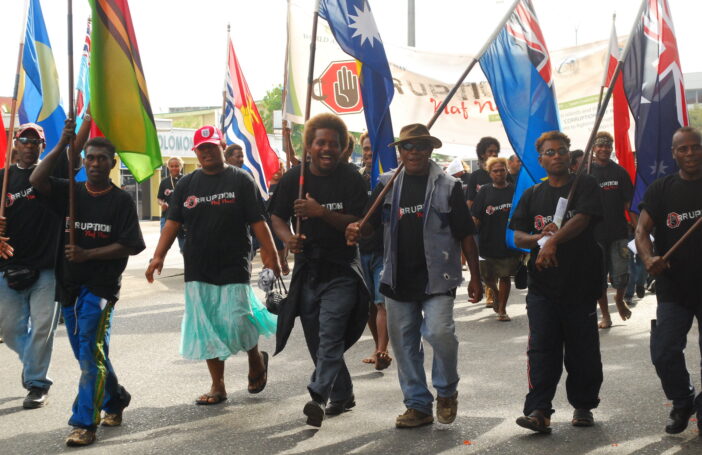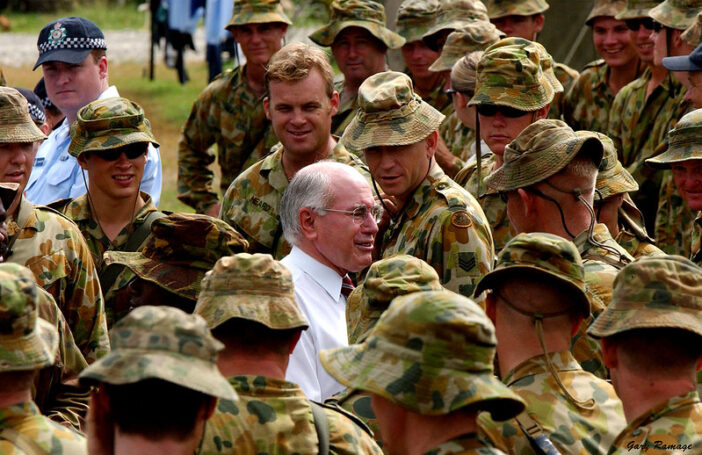This is the first in a series of blog posts looking at the Regional Assistance Mission to Solomon Islands (RAMSI) as it marks its tenth anniversary (23July 2003), and enters a new period of transition (1July 2013). The series is collected here.
Solomon Islands is a very different nation from the one that greeted RAMSI when it arrived on 24 July 2003. Security has improved, services are being delivered and the economy is growing.
RAMSI quickly dealt with the problems of lawlessness and conflict. It arrested leaders of the ‘tensions‘, enforced a prohibition on firearms and began rebuilding the Royal Solomon Islands Police Force (RSIPF). Solomon Islands now has no militias, no militant training camps and no confirmed trade in illicit weapons. Firearm incidents have been extremely rare with only 11 confirmed reports of firearms being discharged since RAMSI’s arrival ten years ago.
RAMSI’s development assistance program has been focused on three areas or ‘pillars’.
The machinery of government pillar has helped to strengthen institutions, including the National Parliament Office, Electoral Commission, accountability institutions, Ministry of Public Service and Office of the Prime Minister. It has also helped Solomon Islands reinvigorate Parliamentary committees, resolve a backlog of cases in the Ombudsman’s Office, develop a code of conduct for public servants, and create a new centralised IT system. Since 2008, Solomon Islanders have led all audits carried out by the Office of the Auditor General.
The law and justice pillar has produced a number of key outcomes since 2003, notably the restoration of law and order and the surrender of almost 4,000 firearms. It has brought correctional facilities up to UN standards; and is working to rebuild the Solomon Islands justice system so it can operate effectively, fairly and openly. Solomon Islanders now head the majority of the nation’s law and justice posts – with the Chief Justice, Attorney-General, Director of Public Prosecutions, Public Solicitor and Commissioner for Correctional Services all being Solomon Islanders. The correctional service now operates with minimal adviser support. A serious shortage of legal workers to staff the justice system continues to present challenges. Crime is stable at low rates.
The economic governance pillar has helped achieve a substantial recovery in the Solomon Islands economy and public finances. This has been facilitated by the restoration of law and order, successive governments displaying fiscal discipline and control and a commitment to economic and financial reforms, and the support of development partners.
Over the past decade, the economy has grown steadily and by over 80 per cent in real terms, interrupted only by the effects of the Global Financial Crisis (GFC) in 2009. Government revenue, which had been severely constrained, has recovered strongly and government expenditure has grown and become more controlled. The government has delivered mainly balanced or surplus budgets over the past decade. This fiscal discipline, combined with debt workouts and agreements in the early period of RAMSI and no new borrowing over the past decade, has seen an impressive turnaround in the public sector’s debt position. This has positioned the Government to be able to undertake limited new borrowing for high quality infrastructure / social investments.
The stability over the past decade has provided an environment in which investment and trade have been able to grow. This has buoyed the private sector, providing increased employment and other opportunities for Solomon Islanders to support themselves and to contribute productively to society. Economic reforms that have been introduced, including cuts to import tariffs, have helped to reduce costs and stimulate growth. The introduction of telecommunications competition in 2010 has led to better coverage and halved retail costs.
The achievements over the last decade need to be viewed in the context of the events over the five years or so prior to RAMSI’s arrival. Between 1998 and 2003, the economy and public finances of Solomon Islands experienced a massive collapse – real GDP fell by around 62 per cent and the decline in real GDP per capita was even greater as the population continued to grow.
While good progress has been made in relation to economic and public finance outcomes over the past decade, future progress will depend upon continuing fiscal policy discipline and reforms being cemented and enhanced. The GFC period demonstrated how vulnerable and fragile the economy is to shocks. In an environment where logging has been occurring at an unsustainable rate and is expected to fall away sharply over the medium term, this adds to risks around macroeconomic stability and growth.
RAMSI is changing
RAMSI is changing because of the progress that has been made. The Solomon Islands Government and RAMSI have decided that the time is right for changes to make RAMSI a policing-only mission.
On 1 July 2013, RAMSI’s development assistance programs will shift across to the bilateral aid programs managed out of the Australian and New Zealand High Commissions.
RAMSI’s military component will leave Solomon Islands in July/August 2013 sending a clear signal that Solomon Islands no longer needs an extraordinary intervention involving a foreign military force. They are leaving because their job is done (the last time the military were formally called upon to assist the police restore public order was in 2006). Today, the security challenges facing Solomon Islands, such as the risk of public disorder and family violence, are handled by the Royal Solomon Islands Police Force. The RSIPF are fully in charge of everyday policing.
However RAMSI’s Participating Police Force will stay in Solomon Islands for four more years. They will continue to provide training and support to the RSIPF especially in leadership development, public order management, logistics, human resources and administration. They will retain their armed capability to back-up the RSIPF where needed and as requested.
Over the next four years, RAMSI will remain a regional mission with all Pacific Island countries contributing police officers. The Pacific Islands Forum will retain broad oversight of RAMSI’s activities in Solomon Islands.
Nicholas Coppel is RAMSI’s Special Coordinator, a position he has held since March 2011. He is a senior Australian career diplomat with previous postings to Papua New Guinea (Deputy High Commissioner), the Philippines (Deputy Chief of Mission) and the United States of America.





